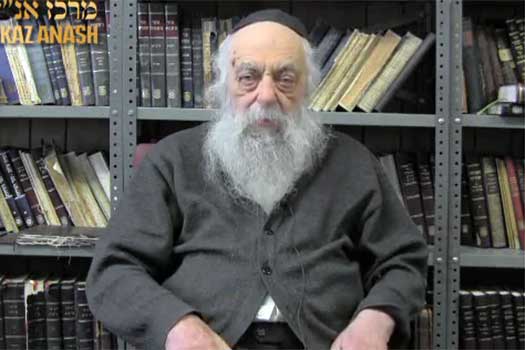
Reb Yoel Kahn: In This World
Due to the overwhelming response and demand from the community, Reb Yoel Kahn agreed to present a weekly webcast on topics that are timely and relevant. This week’s topic is titled ‘In This World‘.
Reb Yoel Kahn, known to his thousands of students as “Reb Yoel,” serves as the head mashpia at the Central Tomchei Temimim Yeshivah in 770. For over forty years he served as the chief ‘chozer’ (transcriber) of all the Rebbe’s sichos and ma’amorim. He is also the editor-in-chief of Sefer HoErchim Chabad, an encyclopedia of Chabad Chassidus.
In response to the growing thirst of Anash for Chassidus guidance in day-to-day life, Reb Yoel has agreed to the request of Merkaz Anash to begin a series of short video talks on Yomei d’Pagra and special topics.
The video was facilitated by Beis Hamedrash L’shluchim, a branch of Merkos L’Inyonei Chinuch
In parshas Shlach we are told the story of the meraglim, who, in an effort to discourage the Jews from entering Eretz Yisroel, claimed that the natives were so powerful that they were unconquerable. They stated “ki chazak hu mimenu,” literally “the nation is stronger than Him,” which was a veiled implication that even Hashem would be unable to best the Canaanites.
Yet these spies had witnessed a constant stream of miracles from Hashem, ranging from the elimination of the Egyptians and the ferocious desert snakes purged by the aron, to the miraculous sustenance offered by the manna and Miriam’s well. Having witnessed these, how could they honestly suggest that Hashem was no match for the inhabitants of Canaan, particularly since those were said to have “melted” in fear from the splitting of the Red Sea?
Fear of Being Swallowed
Chassidus explains that the meraglim were primarily concerned about protecting their ability to be secluded from the world. They were aware that everything would change once they entered Eretz Yisroel: instead of receiving food from Heaven, they’d be compelled to farm the land, and their clothes wouldn’t be tended to by the Clouds of Glory anymore either. Once occupied with the mundanities of ordinary life, no time or energy would remain to focus on the pursuit of spirituality.
They alluded to this when they described the land as “eretz ocheles yoshveha,” consuming its dwellers, because like the digestive system which absorbs food into the body, the spies feared that the ‘arztiyus,’ the earthiness that would typify this future life, would swallow their religious ambitions.
Calev responded to their concerns by stating “lachmeinu heim,” they are our bread: Not only won’t we be consumed by this land, but, if Hashem wishes, we will consume it and turn it into a vehicle for holiness. But the meraglim disagreed, insisting on their desire to maintain their desert lifestyle.
Land is Good
Firmly convinced of the midbar’s superiority, they extended their argument to the viability of conquering Eretz Yisroel: Attempting to revert to life in nature would mean relinquishing the miraculous playbook they’d come to rely on in the desert, because only living apart from worldliness lent itself to transcending earthly boundaries. But all of that would end once they reentered civilization, and then the land would indeed consume them, because objectively they were no match for the natives without the aid of miracles.
Calev’s response to this was “tova ha’aretz meod meod,” the land is very, very good: Hashem wishes that we perform mitzvos specifically within the physical framework of teva. Unlike the desire of the spies to focus less on actions and more on the divine, it is “eretz,” imbuing spirituality into thegashmiyus used for mitzvos, that is “very good,” and therefore the Jewish invasion of Eretz Yisroelwould employ G-dliness to overtake nature itself.
Transcending Nature From Within
The lesson here is that we cannot make the mistake of believing that we’re only in touch with holiness while engaged in learning and davening. We cannot think that we can only transcend teva when we’re avoiding our everyday earthly lives, and that Torah’s instructions (particularly about integrity in business) fall by the wayside when we’re occupied with earning a living by natural means. We cannot separate the two. Within the everyday realm of commerce, “hu ha’nosein lecha koach laasos chayil,” Hashem is operating on a plane transcending teva from within, giving us the power to succeed.
This is also why the Jews crossed the Jordan and conquered Yericho’s walls with the help of the aron. While Hashem instructed them to operate like a military, they were also to bring the aron, the dimensions of which defy space, and thereby to surmount nature itself. We cannot retreat into the desert, but rather must transform Canaan into Eretz Yisroel, and, as Calev said, if it’s Hashem’s desire, we will rise and conquer it; instead of the earth consuming us, we will consume it, and turn eretz intokedusha.
For further learning see לקוטי שיחות חלק ד’ פרשת שלח.













